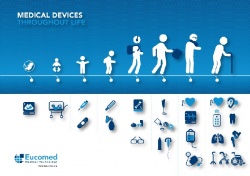A burden of € 17.5 billion for unnecessary measures
Current regulatory proposal for a centralised authorisation system for medical devices puts patients, SMEs and jobs at great risk
The results of a survey amongst medical device companies in Europe about the financial impact of the upcoming changes in the European medical device regulation show a significant increase in costs for bringing new devices to patients.


In addition to the necessary € 7.5 billion investment to ensure the safety of patients, a shocking additional € 17.5 billion would be necessary to finance a centralised pre-marketing authorisation system as proposed by the European Parliament’s Rapporteur. Research shows that such an authorisation system does not improve patient safety and makes patients wait unnecessarily 3-5 years before receiving lifesaving medical devices. The result of such an enormous unnecessary increase in costs will most likely be a drain of innovation and leaving Europe with less SMEs, jobs and less R&D capabilities, ultimately leading to less treatment options for patients.
Eucomed, the European medical technology industry association, conducted the survey amongst its members to assess the financial impact from 2015 to 2020 of the current proposals for the Revision of the EU Medical Devices Directives. The results indicate that it will cost a SME an additional € 17.5 million to bring yearly a new Class III device to patients under the centralised premarket authorisation system as proposed by the European Parliament’s Rapporteur. If the European’s Commission original scrutiny procedure (article 44) becomes a reality, a procedure that gives a false sense of security, it will cost a SME an additional € 2.5 million to bring yearly a new Class III device to patients.
“It is crystal clear that our industry is willing and committed to invest in measures that effectively improve the system to ensure patient safety. These measures include for example the introduction of a unique device identification system and improvements in labelling and clinical performance data, which will require a 7.5 billion Euro investment. But asking SMEs to invest additional millions of Euros in a system that will not effectively improve patient safety nor vigilance is outrageous. Not only will it kill the SME and innovation ecosystem in Europe with many jobs, it will also limit innovative treatment options being available to patients. Let’s also not forget that innovative medical technologies have proven to be cost-effective and help healthcare systems become more sustainable. In the end it will be the patients and society paying the bill” says Serge Bernasconi, Chief Executive Officer of Eucomed.
Discussions in the European Parliament are currently ongoing and various compromise proposals are on the table, which lean towards a heavier and more complex scrutiny procedure than the one proposed by the European Commission. This would put the costs significantly higher than the Commission’s proposal and yet to be determined how close they would come to the costs of the Rapporteur’s centralised approach.
Medical device manufacturers recognise that the current system needs an overhaul and acknowledge that change is necessary to improve Europe’s medical device regulatory framework. Industry has provided clear suggestions for necessary and effective improvements to strengthen the system. Especially with regards to the approval process and Notified Bodies, professional organisations that are authorised by national governments to assess the safety of medical devices before allowing them to be made available to patients, industry has suggested to:
- Determine the appropriate competence that Notified Bodies must have in place to properly assess clinical evidence;
- Determine strict and harmonised measures that Competent Authorities must apply for the designation, monitoring and control of Notified Bodies.
Contrary to the Commission’s scrutiny procedure (article 44) and the Rapporteur’s centralised approval process, implementing both propositions would lead to an EU-wide consistent, high quality approval system that does not unnecessary delay lifesaving treatments reaching patients and does not lead to an enormous bureaucratic burden.
“It makes no sense asking industry to invest on top of the 7.5 billion Euro an additional 2.5 billion Euro for the European’s Commission scrutiny procedure or an additional 17.5 billion Euro for the Rapporteur’s centralised premarket authorisation system if they both can’t guarantee an effective improvement in safety for patients. To place the numbers into context, our total R&D budget is 20 billion Euro so the additional costs of both proposals will have a serious impact on our innovation capabilities in Europe and will drive many investors to geographical areas outside Europe. I trust the political parties in the European Parliament will keep their promise to ensure patient safety, create jobs and stimulate innovation in Europe. We have proposed an effective solution and I truly hope this option is being discussed as the European Parliamentarians in the Public Health Committee are preparing for their vote on 18 October”, says Serge Bernasconi, Chief Executive Officer of Eucomed.
12.09.2013





